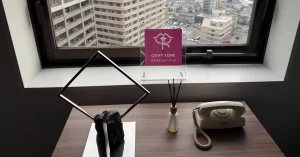I have several themes that I intend to think about throughout my life, and one of them is “working. I have always been interested in “working” because I have been studying it since college and also because I worked for a time in a job specializing in labor law.
As a child, I was more than a little afraid that I would have to work as an adult someday, and I didn’t want to anyway. Especially since my father did hard physical labor, and I saw him working day after day with a voice that bordered on moaning, and I thought to myself at an early age that I couldn’t do it and didn’t want to do it, even though it wasn’t very hard for me.
Why do people have to work? It may be too vague a question, but if it is limited to salarymen, I think Haruki Murakami’s answer, in response to a reader’s question in his book “So, Let’s Ask Murakami-san,” is in a sense the most qualified: “Working for a company will only wear you out by being worn out by being worked hard. These words have always resonated with me.
No matter how rewarding the job may be at a large company, in the end, it is only one-sided use that wears out the mind. This thought grew stronger day by day as I watched my parents, who were wearing out day by day as their bodies ached.
On the other hand, there is an unmovable reality that “in order to eat, we have no choice. However, if living and working are equal, are living and working hard equal? To what extent should we endure it? I am very curious about the borderline between the two.
Of course, there are many people who work without asking these questions. Many people may think that living, i.e., working happily, is the way to go.
This may be by chance, or at least I have rarely seen anyone around me who enjoys working. All I see are people who are working painfully in order to survive. I even wonder if there really are people who enjoy working. Anyway, I would like to see them in real life, not on YouTube, which is a beautiful drama or a dream that encourages people to dream.
What kind of person do I imagine is “working happily”? Probably someone who at least has a sense of fulfillment in their work.
I have always wanted to make “living = working happily” at some point in my life. I thought that would be the closest I could get to becoming a novelist, although this was a big mistake (more on that another time).
Then, when I left college, I hated the idea of getting a job. I was so disgusted that I even started correspondence courses for a certification that would allow me to start my own business.
However, my novels didn’t turn out to be any good, and I got a job as an ordinary salaried worker. There, instead of experiencing the harshness of reality as I had expected, I was beaten to the ground. It was also the first opportunity for me to think about what it means to work.
From this point on, I am quite dogmatic, but the conclusion I have come to is that salarymen (including government employees) are, to all intents and purposes, nothing more than modern-day slaves. This may be a bit radical, but an employment contract is, after all, a slave contract.
Furthermore, “to live = to work happily” is difficult to achieve as long as you are a salaried worker.
I read in a book about slaves a long time ago that there were two types of slaves, senior slaves and junior slaves, and that among the senior slaves, there were some who worked with aversion, while among the junior slaves, there were a certain number who happily indulged in slavery.
This means that the employment contract, which today is also a slave contract, has a different meaning when it comes to working and when it comes to being made to work.
If you look at it from the positive aspect of working, it is an employment contract, but if you look at it from the aspect of being made to work, it is just a slave contract.
Of course, as you know, in the real world, the power relationship between labor and management is not equal (labor laws are designed to make them closer to equal). Inevitably, the employer side tends to be stronger and the worker side weaker.
The fact that it is practically impossible to dispute the content of an employment contract at the time of signing (in some companies, the contract is not even signed) is evidence of this.
And the labor-management disputes that arise from this are caused by this mismatch between the power relationship between labor and management and the job. For those who are forced to work and take it as a slave contract, working is a painful experience. They put up with it and one day it explodes. This triggers, sometimes, a dismissal from the company and a court case.
Working style is the very essence of a person’s work ethic (way of life), and it is different for each person. The problem starts with trying to fit everyone into the same format such as work rules. This is why many workers are worn out.
Nowadays, people are doing what they love. We hear the grating words about working freely and fulfilling one’s dreams. At the same time, we hear about overwork and reforming the way we work.
However, to be honest, most salarymen are probably working at the very edge of their physical and mental capacity, wondering whether or not they will be able to endure tomorrow’s work.
The level of tolerance also varies from person to person.
If you think it is a black company, it is not necessarily a bad thing. If you think it is a white company, it is a good place for you to get the tools you need for your future.
The hardest thing for the person is not knowing what he or she is working for. Is it for food, or more importantly, is it for money, for feeling fulfilled, or is it a minimal act to make a living? If it is for money, how much money will satisfy you? Is it for satisfaction?
If you think about these things from the time you are a student, preferably before you start working, I think you will be able to come to terms with yourself a little easier, even if it is the same life that is wearing you down.
To work is to live. However, it is a mistake to lose your life by working. The employer is responsible for death from overwork, but if workers do not think about it in their own way, it is they themselves who will suffer irrevocable loss.
It would be best if play = work = life (there are many business books to make this happen), but that may be an unrealized dream for most salarymen.
See you soon.












